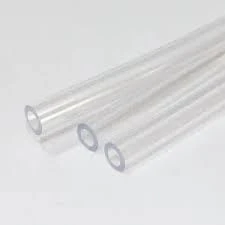Aug . 07, 2024 14:15 Back to list
Understanding the Benefits and Applications of PVC Sewer Pipe in Modern Plumbing Systems
Understanding PVC Sewer Pipes A Comprehensive Overview
Polyvinyl chloride (PVC) sewer pipes have become a staple in modern plumbing systems due to their durability, lightweight properties, and cost-effectiveness. This material has revolutionized the way we approach sewage and wastewater management, providing solutions that are both efficient and environmentally friendly.
What is PVC?
PVC, or polyvinyl chloride, is a synthetic plastic polymer widely used in construction, plumbing, and various other applications. Its chemical structure makes it resistant to corrosion and degradation, which is critical for sewer systems that are often exposed to harsh environmental conditions. If you're in construction or plumbing, the advantage of using PVC pipes cannot be overstated.
Advantages of PVC Sewer Pipes
1. Corrosion Resistance Unlike traditional metal pipes, PVC sewer pipes are resistant to corrosion caused by chemicals found in wastewater. This characteristic significantly extends their lifespan and reduces maintenance costs.
2. Lightweight PVC pipes are considerably lighter than their metal counterparts, making them easier to handle, transport, and install. This not only saves labor costs but also reduces the physical strain on workers.
3. Cost-Effectiveness The overall cost of PVC pipes is lower than that of other materials like concrete or metal. The combination of low material cost, ease of installation, and reduced maintenance makes PVC a financially attractive option for both residential and commercial applications.
pvc sewer pipe

4. Flexibility and Strength Despite being lightweight, PVC pipes are robust and can withstand significant pressure. They also have some flexibility, which allows them to be installed in various configurations without the risk of breaking.
5. Environmental Impact PVC pipes are recyclable, reducing waste in landfills. Additionally, they contribute to fewer energy expenditures during production and installation. Many manufacturers are adopting sustainable practices, further enhancing the environmental benefits of using PVC.
Applications of PVC Sewer Pipes
PVC sewer pipes are primarily used in a variety of piping systems related to sewage disposal. They are ideal for residential plumbing, stormwater drainage, and sewer main installations. Additionally, these pipes are often employed in industrial applications where wastewater needs to be transported securely and efficiently.
Installation and Maintenance
Installation of PVC sewer pipes is a straightforward process, thanks to their lightweight nature and the availability of various fittings. They can be joined using solvent cement, which creates a solid, leak-proof seal. Maintenance is minimal, but regular checks should be made to ensure that no obstructions or leaks are present. The smooth inner surface of PVC pipes not only improves water flow but also reduces the likelihood of clogs forming over time.
Conclusion
As communities across the globe continue to grow, efficient wastewater management becomes increasingly important. PVC sewer pipes offer a reliable, cost-effective, and environmentally friendly solution for modern plumbing needs. With their numerous benefits, it’s no surprise that these pipes have emerged as the material of choice for many contractors and homeowners alike. By choosing PVC, individuals and businesses are making a sound investment in their plumbing systems, contributing to better health and sanitation standards in their communities. The future of sewer management is undoubtedly in good hands with PVC technology.
-
PVC Grey Sheet for Extraction: Chemical Resistant & Durable
NewsAug.19,2025
-
Durable PVC Pipe Fittings for Plumbing & Irrigation Needs
NewsAug.18,2025
-
HDPE Steel Belt Reinforced Spiral Corrugated Pipe | High Strength
NewsAug.17,2025
-
HDPE Pipe Fittings: Durable, Leak-Proof Solutions
NewsAug.16,2025
-
Premium CPVC Sheet: High-Temp & Chemical Resistant Solutions
NewsAug.15,2025
-
Durable PPR Pipe for Hot & Cold Water Systems - Easy Install
NewsAug.14,2025

